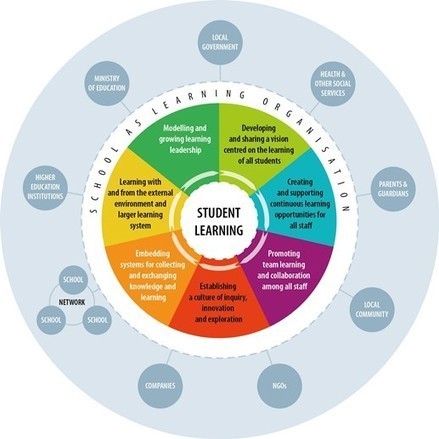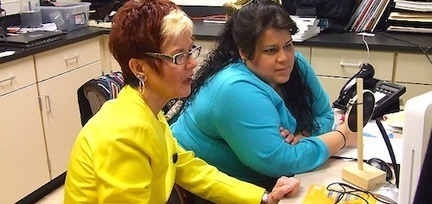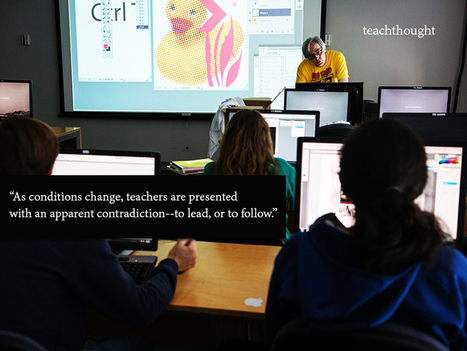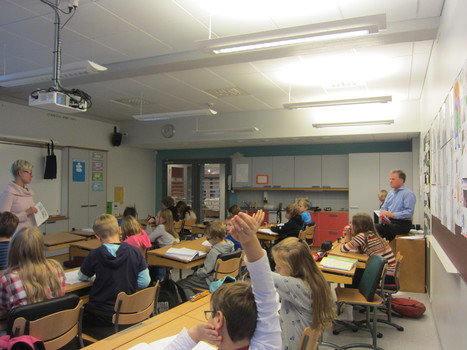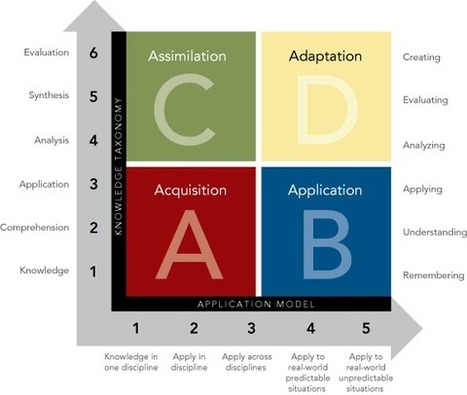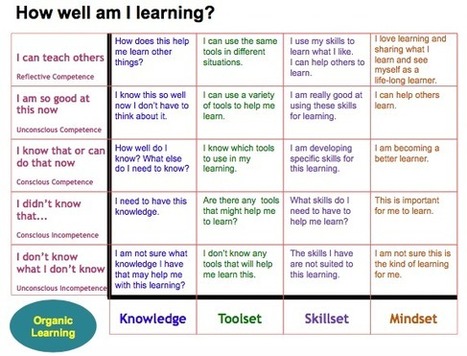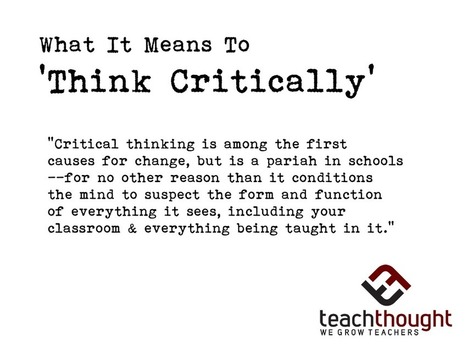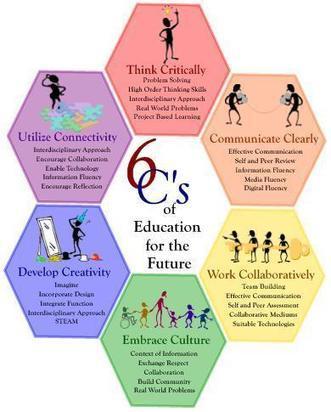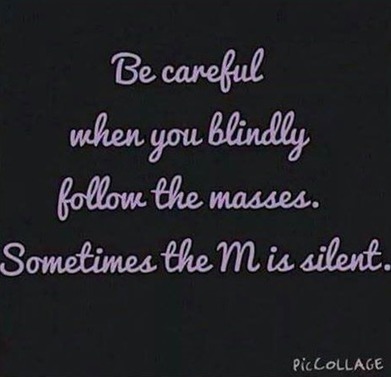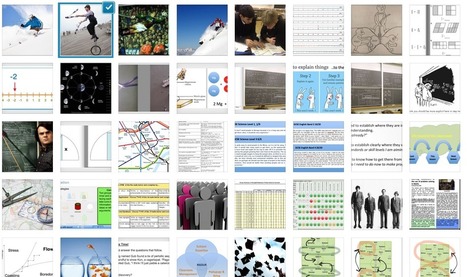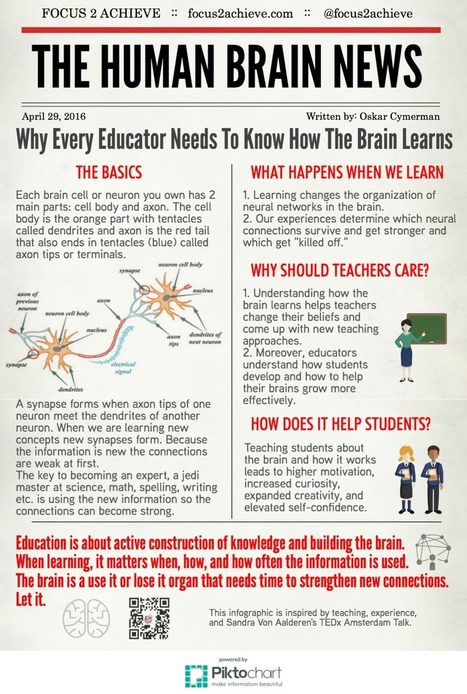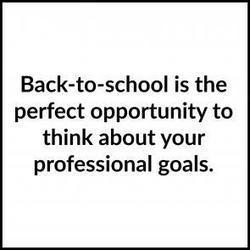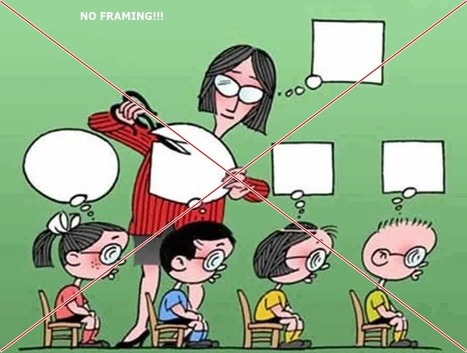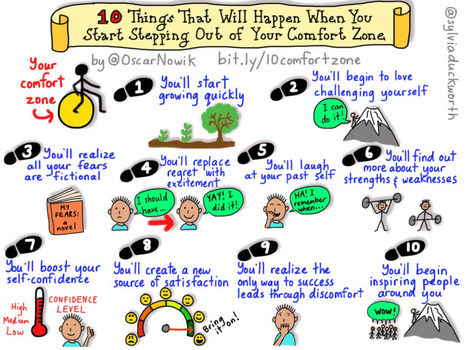 Your new post is loading...
 Your new post is loading...
Schools nowadays are required to learn faster than ever before in order to deal effectively with the growing pressures of a rapidly changing environment. Many schools however, look much the same today as they did a generation ago, and too many teachers are not developing the pedagogies and practices required to meet the diverse needs of 21st-century learners.
In response, a growing body of scholars, educators and policy makers around the world is making the case that schools should be re-conceptualised as “learning organisations” that can react more quickly to changing external environments, embrace innovations in internal organisation, and ultimately improve student outcomes. Despite strong support for and the intuitive appeal of the school as a learning organisation, relatively little progress has been made in advancing the concept, either in research or practice. This lack of progress partly stems from a lack of clarity or common understanding of the school as learning organisation. Learn more / En savoir plus / Mehr erfahren: https://gustmees.wordpress.com/2014/03/29/practice-learning-to-learn/ https://gustmees.wordpress.com/2015/07/19/learning-path-for-professional-21st-century-learning-by-ict-practice/ http://www.scoop.it/t/21st-century-learning-and-teaching/?&tag=modern-education
Via Edumorfosis, Lisa Marie Blaschke, Gust MEES
Teacher professional learning is of increasing interest as one way to support the increasingly complex skills students need to learn in preparation for further education and work in the 21st century. Sophisticated forms of teaching are needed to develop student competencies such as deep mastery of challenging content, critical thinking, complex problem-solving, effective communication and collaboration, and self-direction. In turn, effective professional development (PD) is needed to help teachers learn and refine the pedagogies required to teach these skills. However, research has shown that many PD initiatives appear ineffective in supporting changes in teacher practices and student learning. Accordingly, we set out to discover the features of effective PD. This paper reviews 35 methodologically rigorous studies that have demonstrated a positive link between teacher professional development, teaching practices, and student outcomes. We identify the features of these approaches and offer rich descriptions of these models to inform those seeking to understand the nature of the initiatives. Learn more / En savoir plus / Mehr erfahren: https://gustmees.wordpress.com/?s=coaching https://gustmees.wordpress.com/?s=professional+development
Via Gust MEES
Learn how to balance honesty with compassion for maximum impact Whether you're a leader or a peer, part of your responsibility is to give people feedback. Having been raised in a culture that often dances around the truth and tiptoes near insecurities, you may lack the skills required to balance brutal honesty with a sense of compassion. Think about the feedback you've been given. Chances are, in some of those situations, the feedback was hurtful. Other times, after the initial sting subsided, you learned a great deal about yourself. In the best type of feedback, however, you felt respected, safe, and pushed slightly outside of your comfort zone. That's because the most effective type of feedback is tailored to the individual--making him or her feel appreciated and pointing out where growth needs to occur. Finding that perfect mix is easier than you think. Learn more / En savoir plus / Mehr erfahren: http://www.scoop.it/t/21st-century-learning-and-teaching/?tag=feedback
Via Gust MEES
Critical Thinking and Students
Designing instruction that fosters critical thinking skills is a necessary part of our instructional process. We must make sure to proactively differentiate the learning to guide our students through a variety of levels of understanding.
Bloom’s Taxonomy has stood the test of time to empower our own thinking and reflective practices. Specifically the revised taxonomy and questioning techniques continue to guide teachers to evolve with the times to support learning through carefully designing and meaningful active learning for everyone.
Check out Literacy is Not Enough to think about applying the important skills of problem solving, creativity, collaboration, analytical thinking, ethics, action, and accountability (Crockett, Jukes, & Churches, 2011).
Now let’s make a shift. Think about how critical thinking skills could transform the process of co-teaching!
Let’s take a few mindful moments to realize the opportunities for your own critical thinking evolution.
Learn more / En savoir plus / Mehr erfahren: http://www.scoop.it/t/21st-century-learning-and-teaching/?tag=Team-Teaching http://www.scoop.it/t/21st-century-learning-and-teaching?tag=Critical-Thinking
Via Gust MEES, Educational Peaks
Spend five minutes in Jussi Hietava’s fourth-grade math class in remote, rural Finland, and you may learn all you need to know about education reform – if you want results, try doing the opposite of what American “education reformers” think we should do in classrooms.
Instead of control, competition, stress, standardized testing, screen-based schools and loosened teacher qualifications, try warmth, collaboration, and highly professionalized, teacher-led encouragement and assessment.
At the University of Eastern Finland’s Normaalikoulu teacher training school in Joensuu, Finland, you can see Hietava’s students enjoying the cutting-edge concept of “personalized learning.”
Learn more / En savoir plus / Mehr erfahren: http://www.scoop.it/t/21st-century-learning-and-teaching/?tag=Finland http://www.scoop.it/t/21st-century-learning-and-teaching/?tag=Personalized+Learning
Via Gust MEES
The Rigor Relevance Framework®
The Rigor/Relevance Framework is a tool developed by the International Center to examine curriculum, instruction, and assessment along the two dimensions of higher standards and student achievement. It can be used in the development of both instruction and assessment. In addition, teachers can use it to monitor their own progress in adding rigor and relevance to their instruction, and to select appropriate instructional strategies for differentiating instruction and facilitating higher achievement goals.
The Knowledge Taxonomy (y-axis) is a continuum based on the six levels of Bloom's Taxonomy, which describes the increasingly complex ways in which we think. The low end involves acquiring knowledge and being able to recall or locate that knowledge. The high end labels the more complex ways in which individuals use knowledge, such as taking several pieces of knowledge and combining them in both logical and creative ways. Learn more / En savoir plus / Mehr erfahren: http://www.scoop.it/t/21st-century-learning-and-teaching/?tag=Rigor
Via Gust MEES
Critical Thinking
As an organization, critical thinking is at the core of what we do, from essays and lists to models and teacher training. (You can check out What It Means To Think Critically for a wordier survey of the intent of critical thinking.)
For this post, we’ve gathered various critical thinking resources. As you’ll notice, conversation is a fundamental part of critical thinking, if for no other reason than the ability to identify a line of reasoning, analyze, evaluate, and respond to it accurately and thoughtfully is among the most common opportunities for critical thinking for students in every day life. Who is saying what? What’s valid and what’s not? How should I respond?
This collection includes resources for teaching critical thinking, from books and videos to graphics and models, rubrics and taxonomies to presentations and debate communities. Take a look, and let us know in the comments which you found the most–or least–useful. Learn more / En savoir plus / Mehr erfahren: http://www.scoop.it/t/21st-century-learning-and-teaching?tag=Critical-Thinking
Via Gust MEES
At some point in our lives, we’ve all practiced some counterproductive learning habits. We’ve sabotaged ourselves without realizing it, and found ourselves stuck. There have been failures we believe have defined our potential. We’ve obsessed over perfect solutions and singular pathways. In frustrated moments we’ve refused help from others, thinking acceptance means weakness. We’ve done this as teachers, students, friends, and parents.
These are not crimes; they’re part of what makes us human. Our counterproductive learning habits usually come from what we observe and hear. We pick things up as children from well-intentioned adults in our lives. In addition, the experiences of others constantly unfold right in front of us. We observe actively, and we remember.
Eventually we come to believe that what we see is how things are, and that it never changes. We know now that this doesn’t have to be the case. We know now that we can create our own experiences. Let’s make them good ones when it comes to learning.
Leartn more / En savoir plus / Mehr erfahren: https://gustmees.wordpress.com/2015/07/19/learning-path-for-professional-21st-century-learning-by-ict-practice/
Via Gust MEES
This easy-to-use Microsoft Word rubric template -- created by Cait Camarata, Edutopia's visual designer -- can be modified to suit your own needs. It is also available in Google Docs format. Read about some of the elements of well-designed rubrics in the associated post: "4 Easy Tips and Tricks for Creating Visually Engaging Rubrics." Learn more: http://www.scoop.it/t/21st-century-learning-and-teaching/?tag=rubric
Via Gust MEES
The illiterate of the 21st century will not be those who cannot read and write, but those who cannot learn, unlearn and relearn.
Via Gust MEES
|
Mastery learning is the idea that students should adequately comprehend a given concept before being expected to understand a more advanced one. This idea has a long tradition in educational theory and research. In 1919, superintendent Carleton W. Washburne in Winnetka, Illinois, showed that students could advance at their own pace if they mastered a concept before moving on to something more complicated. Years later, building on Washburne’s work, educational psychologist Benjamin Bloom coined the term “mastery learning.” In 1984, in Bloom’s seminal study, “The 2 Sigma Problem,” he showed that mastery-based one-on-one tutoring is two standard deviations more effective than conventional instruction. (That means it would take the average for a cohort of students from the 50th percentile to the 98th percentile!). Ever since, educators have sought ways to make mastery learning available to all students. Learn more / En savoir plus / Mehr erfahren: http://www.scoop.it/t/21st-century-learning-and-teaching/?tag=modern-education http://www.scoop.it/t/21st-century-learning-and-teaching/?tag=Learning+by+doing http://www.scoop.it/t/21st-century-learning-and-teaching/?tag=Practice
Via Gust MEES
Critical Thinking and Students
Designing instruction that fosters critical thinking skills is a necessary part of our instructional process. We must make sure to proactively differentiate the learning to guide our students through a variety of levels of understanding.
Bloom’s Taxonomy has stood the test of time to empower our own thinking and reflective practices. Specifically the revised taxonomy and questioning techniques continue to guide teachers to evolve with the times to support learning through carefully designing and meaningful active learning for everyone.
Check out Literacy is Not Enough to think about applying the important skills of problem solving, creativity, collaboration, analytical thinking, ethics, action, and accountability (Crockett, Jukes, & Churches, 2011).
Now let’s make a shift. Think about how critical thinking skills could transform the process of co-teaching!
Let’s take a few mindful moments to realize the opportunities for your own critical thinking evolution.
Learn more / En savoir plus / Mehr erfahren: http://www.scoop.it/t/21st-century-learning-and-teaching/?tag=Team-Teaching http://www.scoop.it/t/21st-century-learning-and-teaching?tag=Critical-Thinking
Via Gust MEES
Brain, Learning, and Teaching Infographic
I hope you find the Brain Hacking infographic above useful. You can access the other Brain-Based Learning infographics I created by scrolling down my ED!Blog. Please share it with other educators, parents, and learners. I will feature additional Brain-Based Learning Infographics in my future NEWSLETTERS, so please SIGN UP if you would like to receive more tips and strategies that work in helping students become better learners.
If you find the information in the infographic useful, consider buying "Crush School: Every Student's Guide To Killing It In The Classroom", which is a book I wrote to help students learn more efficiently and effectively using proven research based strategies.
And Remember: You Have the Power to Change the World. Use it often.
Learn more / En savoir plus / Mehr erfahren: http://www.scoop.it/t/21st-century-learning-and-teaching/?tag=Brain
Via Gust MEES
Allison Tallman October 3rd, 2016
In my recent post on teacher training programs, I discussed what I believe to be the characteristics of a high-quality teacher training program—qualities that helped me to best prepare for my first day of school. However, learning doesn’t stop there! With the continuous, nonstop changes in education, teachers are constantly learning new strategies, ideas, and research throughout their career.
Sometimes we are sent out for Professional Development (PD) workshops, while other times we attend required school-based or online sessions. In addition to PD workshops and sessions, teachers may choose to formally continue their education by receiving master’s degrees or a PhD, or by taking individual courses to receive credit.
What if the PD you are receiving doesn’t necessarily meet your needs and professional goals? What if attending graduate school isn’t the best option for you? What if you just don’t have the time to take classes? I believe that it is our job as teachers to be accountable for our own learning by seeking out the information we want to know. This is precisely why back-to-school is the perfect opportunity to think about your professional goals. I appreciate and understand that our time as teachers is valuable, so I present to you my favorite quick and efficient tips to “learn more,” without stepping into a classroom, workshop, or meeting. Learn more / En savoir plus / Mehr erfahren: https://gustmees.wordpress.com/2015/03/15/professional-development-why-educators-and-teachers-cant-catch-up-that-quickly-and-how-to-change-it/ https://gustmees.wordpress.com/2013/01/23/is-your-professional-development-up-to-date/ https://gustmees.wordpress.com/2015/03/28/learning-to-learn-for-my-professional-development-i-did-it-my-way/
Via Gust MEES
"Inquiry happens when you focus on the art of teaching." Kath Murdoch. After the session, I attempt to categorise the teachers’ ideas under conceptual headings. The more I think about their statements, the more my categories overlap. I consider first Kath’s shared list of inquiry practices and then Ron Ritchhart’s cultural forces. In the end it comes down to a handful of big ideas, for me… Language: Use a language of learning not compliance. Choose language that supports learners in describing and reflecting on their thinking and learning.
Process: Focus as much on the process of learning as the content. Use split screen teaching. Notice and name how we are learning, not just what we are leaning. Release: Let go of your expectations and allow students to lead. Ensure the learners do the heavy lifting. Release responsibility as early as possible, then observe where to take the learning next. Teacher as learner: Position yourself as part of the learning community, not as the expert in the room, both physically and through your interactions. Make your own thinking process visible. Time: Do less, but do it more deeply. Devote time to developing learning dispositions. Give children time to reflect on how and why they change their ideas or thinking. Learn more / En savoir plus / Mehr erfahren: https://gustmees.wordpress.com/2016/03/14/time-the-most-important-factor-neglected-in-education/
Via Dean J. Fusto, Mark E. Deschaine, PhD, Gust MEES
Teaching students good learning strategies would ensure that they know how to acquire new knowledge, which leads to improved learning outcomes, writes lead author Helen Askell-Williams of Flinders University in Adelaide, Australia. And studies bear this out. Askell-Williams cites as one example a recent finding by PISA, the Programme for International Student Assessment, which administers academic proficiency tests to students around the globe, and place American students in the mediocre middle. “Students who use appropriate strategies to understand and remember what they read, such as underlining important parts of the texts or discussing what they read with other people, perform at least 73 points higher in the PISA assessment—that is, one full proficiency level or nearly two full school years—than students who use these strategies the least,” the PISA report reads. Learn more / En savoir plus / Mehr erfahren: https://gustmees.wordpress.com/2014/10/03/design-the-learning-of-your-learners-students-ideas/ https://gustmees.wordpress.com/2015/07/19/learning-path-for-professional-21st-century-learning-by-ict-practice/
Via Gust MEES
Time THE MOST Important Factor Neglected In EDUcation! WHY do I mention the word "Time"!? EVER thought about on How-To people learn!? Some are learning very quickly and others need MORE time as OTHERS to understand! BUT THEY ALL have to follow THE same scheme and rhythm in EDUcation, sounds strange isn't it…
Via Gust MEES
|



 Your new post is loading...
Your new post is loading...

